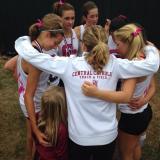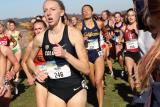Folders |
Running Issues: Catching Up With Brie OakleyPublished by
Former NXN Champ Talks Mental Health And More By Elizabeth Carey for DyeStat Photos by Kim Spir One of Brie Oakley’s proudest moments came in a race that she didn’t win. It wasn’t winning NXN as a Grandview High School senior in 2016 or any one of her Colorado state championships. It was the 2019 NCAA West Region Cross Country Championships — her second race that fall for the University of California-Berkeley. After an early season injury, she’d busted the rust at Pac-12s. Then at Regionals, Oakley says, “I was just excited to be out there, be with my team, and I remember going off the start line and my immediate thought was ‘I’m the fifth runner on our team, that’s where I should be.’ But then I thought, ‘Wait, no! I’m putting myself in this box. I can be up farther if I want to. I don’t need to limit myself.’” Oakley stuck with her top teammates and kept them in her vision. Racing without limits, overthinking, or expectations, was “so freeing, because I feel I haven’t really done that before in a race, or I’ve always had this time in my head and an idea of where I should be,” she says. She surprised herself with a 45th-place finish in 20:57.4 that day in Colfax, Wash. “I remember seeing my coach and he gave me a big hug and I just felt really proud of myself, because I was not only coming back from injury, (but) challenged my thought at the beginning,” she says. The metrics we hold so dear in this sport don’t tell the whole story, or point to some of the most significant triumphs. And they certainly don’t define Oakley, who’s now a senior at Cal. “We think a lot about the numbers and the times and the splits and there’s so much more to that. You can’t really reach your potential if you’re not taking care of your mind,” she says. This is an important reminder for coaches as well as athletes. “You have to look at many factors, not just the time, because at the end of the day what’s most important, someone’s health?” she asks. Oakley shot to high school stardom at Grandview High in Colorado, but has weathered setbacks as a collegiate athlete, including an injury cycle that started her sophomore year and also coaching changes. “The first few injuries I had (were) definitely a wake-up call to me that I was probably not treating my body as well as I should have, and I’m definitely grateful for that, but it doesn’t make it any easier ... I’ve really had to battle with my relationship with running and where I am at mentally,” she says. Despite those struggles, she sees glimmers of hope and increased resilience. “Even though injury has been really difficult, it’s really helped me to mature a lot in running and life in general. It’s humbled me a bit and made me a lot stronger, made me understand that I do have limits, but also I’m really strong and also just how important it is to focus on my mental well-being,” she says. Oakley's experience has taught her that she doesn't have to carry all of her burdens alone. That's also her advice to younger runners. “It’s okay to ask for help,” she says, especially in the face of pressure and stress, whether that manifests as feeling down, eating issues, or other mental health challenges. “I’m definitely a very stubborn person and it has taken me a long time to reach out to people and ask for help because my first instinct is, ‘Oh asking for help is a last resort or it’s a sign of weakness,’ but it’s really not. Humans, we’re social people, and it’s strong. "It's a sign of strength to ask for help,” Oakley says. “It’s encouraging now that there’s so much more talk about mental health. And especially this year with COVID, people are obviously struggling a lot more and just kind of realizing how important it is to prioritize mental health.” Dedicating time every week to focusing on mental health could be helpful for runners, she says. “It’s just hard right now, with everything being online, but it doesn’t make it less important to check in with people and just see how they’re doing.” Entering 2021, Oakley’s looking ahead — fingers crossed, all of us — to racing cross country meets in February, and training with a mix of running, biking and hiking. She has several seasons of eligibility left, but is deciding whether she wants to continue collegiate running. With graduation slated for May, Oakley has set her sights on graduate school, likely in Environmental or Food Science. No mattter what, she wants to keep running and that includes a life-long goal of running the marathon. She’s also eyeing trails and ultras. “I’m hoping my body will hold up. I know it will eventually,” she says. “I definitely want to keep running for a long time.” ### Elizabeth Carey (https://elizabethwcarey.com/) is a writer and running coach based in Seattle, Washington. Her first book, GIRLS RUNNING, co-authored with Melody Fairchild, is available at your local book store and here: https://shop.aer.io/GirlsRunning/p/Girls_Running_All_You_Need_to_Strive_Thrive_and_Run_Your_Best/9781948007184-9934.
More news |





